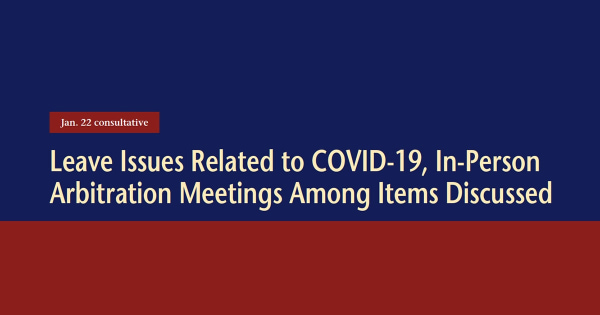January 2021 Consultative
President Brian Wagner, Executive Vice President Ivan D. Butts, Secretary/Treasurer Chuck Mulidore and Executive Board Chair Tim Ford attended the Jan. 22 consultative meeting via Zoom. Representing the Postal Service were Bruce Nicholson and James Timmons, Labor Relations Policy Administration.
Agenda Item #1
NAPS requested procedural guidance from USPS Headquarters for addressing COVID-19 leave.
The “Families First Coronavirus Response Act” (FFCRA) that required the Postal Service to provide up to 80 hours of emergency paid sick leave for specific reasons related to COVID-19 expired on Dec. 31. An updated decision tree was issued on Jan. 21 to assist managers and district and area Human Resources with how to respond to various scenarios and the associated leave status.
Scenario #1: The USPS tells an employee they must self-quarantine because of contract tracing done via USPS personnel following up on a positive COVID-19 case. The employee self-quarantines for two weeks and is given their two weeks’ COVID-19 leave. They do not get COVID-19 and return to work. A few weeks or months later, they test positive for COVID-19.
Question: Is the employee entitled to two weeks admin leave because the USPS told them to self-quarantine after they used their 80 hours of COVID leave previously due to contact tracing?
The 80 hours of emergency paid sick leave that was provided under FFCRA expired on Dec. 31.
Scenario #2: An employee is out on long-term sick leave (for whatever reason, surgery, treatment, recovery, etc.). The employee either contracts COVID-19 (tests positive) or is identified through contact tracing (Department of Health) that they should self-quarantine.
Question—Is that employee allowed to use their 80 hours of COVID leave instead of sick leave?
The 80 hours of emergency paid sick leave that was provided under FFCRA expired on December 31.
Additionally, NAPS asked to confirm if there is a difference between contracting COVID-19 on the clock or off the clock regarding COVID-19 leave usage.
If diagnosed with COVID-19 or possible exposure to it, then it should be reported to the district HR manager and OHNA. Decisions will be made on a case-by-case basis of next steps to include the appropriate leave type. The 80 hours of emergency paid sick leave that was provided under FFCRA expired on Dec. 31.
Agenda Item #2
NAPS has received concerns regarding the practice of holding in-person arbitrations instead of Zoom meetings. There are concerns from EAS employees that the meetings are held in small conference rooms where, although they technically may meet the six-foot social distancing guidelines, the airflow may not always be adequate to prevent the virus’ inhalation.
It has been reported to NAPS Headquarters there have been a couple of instances where participants attended the meeting and, shortly afterward, informed everyone they had been exposed to COVID-19. There is a belief they did not mention the possible exposure in order to avoid cancellation of the meeting.
NAPS requested that the USPS provide the necessary training needed to all parties to use Zoom conferencing and conduct arbitrations via Zoom until the abatement of COVID-19.
A scheduling letter is sent to an arbitrator 30 days in advance of an arbitration hearing. The scheduling letter includes the date, time and location of the hearing. All hearings are conducted on postal property and all facilities are required to follow Maintenance Management Order (MMO) 031-20 and the Centers for Disease Control and Prevention (CDC) guidelines to ensure the safety and well-being of all participants at the hearing.
The advance notice allows district Labor Relations to ensure CDC guidelines are followed and the meeting can be accommodated in the designated room or recommend an alternative location. All parties involved in the hearing are copied on the scheduling letter, which advises of the following:
“In-person hearings will take place with appropriate precautions. All postal facilities follow protocols consistent with CDC guidelines to ensure the safety and well-being of our employees and visitors. These protocols include staying at home if experiencing COVID-19-related symptoms, securing adequate meeting spaces to accommodate social distancing at least six feet apart, wearing face masks, wiping down common areas and having hand sanitizer readily available.”
Any intent to modify an in-person arbitration hearing can be explored on a case-by-case basis; any decision must be amenable by all parties.
Agenda Item #3
NAPS Headquarters has been made aware that, due to COVID-19, FLSA-exempt EAS employees have to take on additional workloads to support other operations. These include transportation, HR and vacant supervisor positions. These additional duties can cause these FLSA-exempt EAS employees to work beyond the eight-hour workday/40-hour work-week.
NAPS requested an exemption for FLSA-exempt EAS employees to be paid for all additional hours required of them to work in support of the continuity of operations during COVID-19.
This is a request to modify existing pay provisions, which is not appropriate as an agenda item for the monthly consultative agenda. This will be addressed in the proper forum for these types of issues.
Agenda Item #4
NAPS has received concerns that, with the expiration of the FFCRA, employees who have a child who still is required to participate in virtual or online learning due to COVID-19 concerns in their school district no longer can use this type of leave. They now must use another leave type.
NAPS understands EAS employees only can take leave in increments of eight hours. However, EAS employees may not be able to work four hours, then go home to participate in their child’s online classroom.
NAPS requested that, in these circumstances, the USPS adjusts eRMS so an EAS employee can work a partial day and still use paid leave for the rest of the day to participate in an online classroom setting for their child. NAPS understands this leave request will be based on the submission of acceptable documentation.
This is a request to modify existing pay provisions, which is not appropriate as an agenda item for the monthly consultative agenda. This will be addressed in the proper forum for these types of issues.
